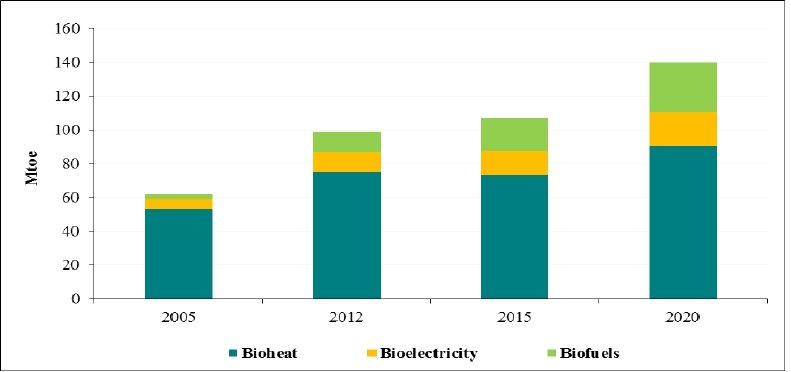Biomass is an endogenous, sustainable and reliable solucion for the Union’s energy dependence
The Ukraine crisis has proved once again the enormous dependency of the EU on energy imports, specifically Russian hydrocarbons. Despite the increasing share of renewables in the energy mix, last year, more than half of the Union energy came from third countries, many of them emplaced in volatile regions. For example, based on the latest figures, imports of Russian natural gas represented a 39% of EU gas imports in 2013, and EU Member States such as Finland, Bulgaria, Slovakia, Latvia, Lithuania Hungary and Estonia are enterely or highly dependent on Russian natural gas. In the case of oil, Russia is the biggest supplier representing a third of all imports. This excessive reliance on unstable energy suppliers can limit the EU capacity to act in the global sphere and may harm its competitivity. As a matter of fact, the EU spent more than billion euros per day in energy imports in 2013, limiting its autonomy and harming its capacity to compete with other major economies.
In this context, renewable energy should be at the center of any European energy security strategy. The EU has the natural resources and the technical and scientific expertise to untap the potential of Europe’s bioenergy. Nowadays, biomass represents a competitive option for heating, reaching more than a 25% share in several EU member states and saving the Union billions in natural gas imports. In the same way, promoting the production and consumption of biofuels would reduce the impact of any energy crisis while boosting quality jobs all along the supply chain. Rural areas specially, would largely benefit of an healthier bioenergy market generating extra revenues for farmers. In 2012 the European bioheat and bioelectricity sectors generated a total turnover of at least EU 33 billion, employing 374,800 people, among which 282,095 jobs in the solid biomass, 68,895 jobs in biogas and 23,935 jobs in waste industry. The recently published EU Energy Security Strategy recognized the essential role of renewables in the heating sector, specifically biomass, but still kept on focusing on the construction of infrastructures for the transport of fossil fuels, specifically natural gas.
According to National Renewable Energy Action Plans (NREAPs), the use bioenergy for electricity and heating is expected keep on growing from 86,5 million tonnes of oil equivalent (Mtoe) in 2012 up to 110.5 Mtoe by 2020, most of it, around an 80% will be used for heating. NREAPs estimate an increase of biomass supply of a 37% up to 132 Mtoe by 2020. This growth shall be based mostly in a stronger mobilization of agriculture biomass for energy, mainly residues and agricultural by-product and biodegradable wastes.

EU biomass consumption in electricity, heating, and transport (Mtoe, 2005-2020) Source: National renewable energy action plans (NREAPs) and 2011 progress reports
The EU institutions should therefore, keep in mind that a strong renewables sector would not only preserve the Union position at the vanguard of the fight against climate change or at the forefront in terms of technology and economic sustainability. A firm position on renewable energies resources would also guarantee a higher degree of autonomy, avoiding any possible blackmailing and strengthening the Union’s voice in international affairs.
Thus, a more ambitious renewable energy goal for 2030 and mandatory national objectives could foster many more jobs and cut extra gas imports. Member States are still in time to approve a more ambitious target. The current situation in the Ukraine must be a wake-up call to react and opt for endogenous and inexhaustible resources. Europe’s economy and its global influence would greatly benefit from a stronger commitment.
Biomass should play a key role in the energy transition and the decarbonization of the EU’s economy. Its characteristics make it a more flexible and versatile type of energy than any other renewable source, for it can be generated when and where it is needed and in different forms, such as biomass for energy in combustion, for syngas production, biogas for production electricity or biomethane for gas grid injection or even biofuels for the transport sector. In summary, biomass can make a significant contribution to reduce the EU’s dependence on hydrocarbon imports and a hurdle to any possible energy supply crisis.
